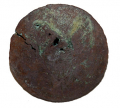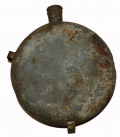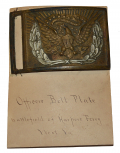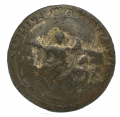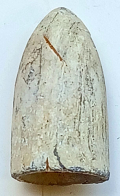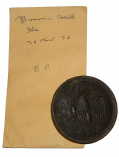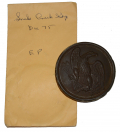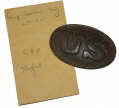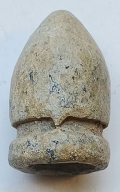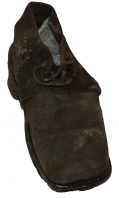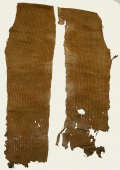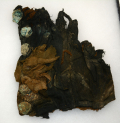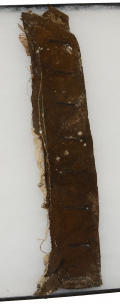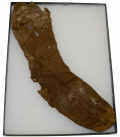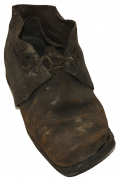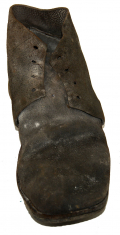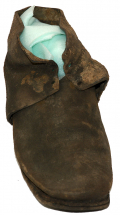site search
online catalog
Relics
Showing 121 to 140 out of 336
US GENERAL SERVICE EAGLE COAT BUTTON RECOVERED AT 3RD CORPS HOSPITAL SITE, GETTYSBURG – KEN BREAM COLLECTION
Dark chocolate patina; has some damage to face – a crack and a few small holes. Some verdigris present. Shank present; more verdigris on reverse. There appears to be a backmark present but it is no… (1163-198A). Learn More »
CONFEDERATE “PIE-PLATE” TIN DRUM CANTEEN
This is an interesting variation on the tin drum canteens that became very popular in the 1850s following the adoption of round drum-shaped tin canteen with convex sides by the US Army in 1836, though… (490-6762). Learn More »
MODEL 1851 SWORD BELT PLATE FROM HARPERS FERRY ON A GREAT DISPLAY CARD
This sword belt plate, a very good example of an early pick-up, is mounted on a great old card typical of early relic displays labeled in brown ink, “Officers Belt Plate / battlefield of Harpers… (1202-196). Learn More »
CIVIL WAR NORTH CAROLINA STATE SEAL BUTTON WITH STAR BACKMARK, TRACES OF SILVER
Civil War North Carolina state seal button with “NORTH CAROLINA” along the top edge and figures of Liberty and Plenty at center. Unmarked, but with small single star in the channel on the back.… (2024-703). Learn More »
$225.00
ON HOLD
CIVIL WAR-INDIAN WAR FORAGE CAP VISOR
This is a well preserved leather visor from a forage cap recovered at Fort Pembina, ND, where it was preserved in remarkable condition by wet, anaerobic soil conditions. This is typical of the simple… (1052-480). Learn More »
CIVIL WAR-INDIAN WAR FORAGE CAP VISOR
This is a well preserved leather visor from a forage cap recovered at Fort Pembina, ND, where it was preserved in remarkable condition by wet, anaerobic soil conditions. This is typical of the simple… (1052-483). Learn More »
.69 CALIBER "NO-RING PRUSSIAN" BULLET
This was for the .69 caliber rifled muskets being used in the Federal service. These were machine "pressed and turned" bullets made at a Federal arsenal. This particular style features no grooves,… (2024-919). Learn More »
RELIC U.S. ENLISTEDMAN’S EAGLE BREAST PLATE FROM BROWN’S MILL, GEORGIA, RECOVERED BY SID KIRKSIS
This excavated Pattern 1839 US cartridge box shoulder sling plate (Eagle breast plate) has a smooth brown patina. The brass face features an eagle clutching arrows and an olive branch. The plate’s… (490-6828). Learn More »
RELIC U.S. ENLISTEDMAN’S EAGLE BREAST PLATE FROM SNAKE CREEK GAP, RECOVERED BY SID KIRKSIS
This excavated Pattern 1839 US cartridge box plate has a smooth brown patina on the face. The oval brass face features a raised “US”. The plate’s reverse has 99% of the lead fill. The two iron… (490-6829). Learn More »
RELIC U.S. ENLISTEDMAN’S CARTRIDGE BOX PLATE MARKED “E. GAYLORD” FROM KENTUCKY, RECOVERED BY SYD KIRKSIS
This excavated Pattern 1839 US cartridge box plate has a smooth brown patina on the face. The oval brass face features a raised “US”. The plate’s reverse has 99% of the lead fill. The two iron… (490-6831). Learn More »
RARE CLEBURNE BULLET – DEAN THOMAS COLLECTION
Dug Confederate “Cleburne” bullet .54 caliber. This is a rare Confederate bullet from the Trans-Mississippi theater. Very few specimens exist. Named such due to them being found in a bivouac site… (236-969). Learn More »
SCARCE CIVIL WAR ARMY ISSUE SHOE, A.K.A. BROGAN OR BOOTTEE
This Civil War US army issue shoe is typical wartime construction, using rough-side out black leather with reinforcing heel piece or “counter” sewn inside, four pairs of holes for a leather lace,… (1052-282). Learn More »
KNIT DRAWERS OR TROUSERS FROM FORT PEMBINA
These pieces are two legs from trousers or, more likely, drawers recovered in the excavations at Fort Pembina, ND, conducted on private property with the owner’s permission, where wet, anaerobic… (1052-446). Learn More »
CIVIL WAR-INDIAN WAR UNIFORM COAT PIECE WITH BUTTONS FROM FORT PEMBINA
This comes from the right lapel of a US army coat discarded by a soldier at Fort Pembina, ND, sometime between 1870 and 1895, and is from excavations in wet, anaerobic soil that has preserved leather… (1052-580). Learn More »
INDIAN WAR FIELD-USED CAMPAIGN HAT FROM FORT PEMBINA, NORTH DAKOTA
This is a real field-used Indian War campaign hat in relic condition excavated at Fort Pembina, ND, a small frontier army post in operation from 1870 to 1895. Anaerobic conditions of the dig have… (1052-253). Learn More »
US ARMY DRESS COAT LAPEL FROM FORT PEMBINA, ND
This coat lapel comes from the left side of US army dress coat discarded by a soldier at Fort Pembina, ND, and was excavated in wet, anaerobic soil that has preserved leather and cloth in remarkable… (1052-589). Learn More »
SOLDIER’S SOCK FROM FORT PEMBINA, ND
This comes from the excavations at Fort Pembina, ND, and appears to be the 1877 pattern army sock, which was medium gray in color, had white toes, and the weave of the heel running parallel with the… (1052-582). Learn More »
SCARCE CIVIL WAR ARMY ISSUE SHOE MADE AND MARKED BY CIVIL WAR CONTRACTOR JOHN MUNDELL OF PHILADELPHIA
This is a typical, though very scarce, Civil War issue army shoe made by a known contractor and marked by him on the inside of the ankle: “J. MUNDELL.” Mundell was born in Ireland in 1829, reached… (1052-298). Learn More »
SCARCE CIVIL WAR ARMY ISSUE SHOE, A.K.A. BROGAN OR BOOTTEE
This Civil War US army issue shoe is typical wartime construction, using rough-side out black leather with reinforcing heel piece or “counter” sewn inside, four pairs of holes for a leather lace… (1052-285). Learn More »
SCARCE CIVIL WAR ARMY ISSUE SHOE, A.K.A. BROGAN OR BOOTTEE
This Civil War US army issue shoe is typical wartime construction, using rough-side out black leather with reinforcing heel piece or “counter” sewn inside, four pairs of holes for a leather lace… (1052-300). Learn More »
Showing 121 to 140 out of 336
Most Popular
Historical Firearms Stolen From The National Civil War Museum In Harrisburg, Pa »
Theft From Gravesite Of Gen. John Reynolds »
Selection Of Unframed Prints By Don Troiani »
Fine Condition Brass Infantry Bugle Insignia »
Large English Bowie Knife With Sheath 1870’S – 1880’S »
Imported (Clauberg) Us Model 1860 Light Cavalry Officer's Saber »
featured item
RARE EBERLE 1796 CONTRACT MARKED BAYONET
This rare bayonet is marked by the maker in a sunken cartouche with raised letters on the base of the blade reading “Eberle.” Charles Louis Eberle emigrated to the U.S. from Germany with brothers George A. and Henry J. in 1794, arriving in… (1052-86). Learn More »



